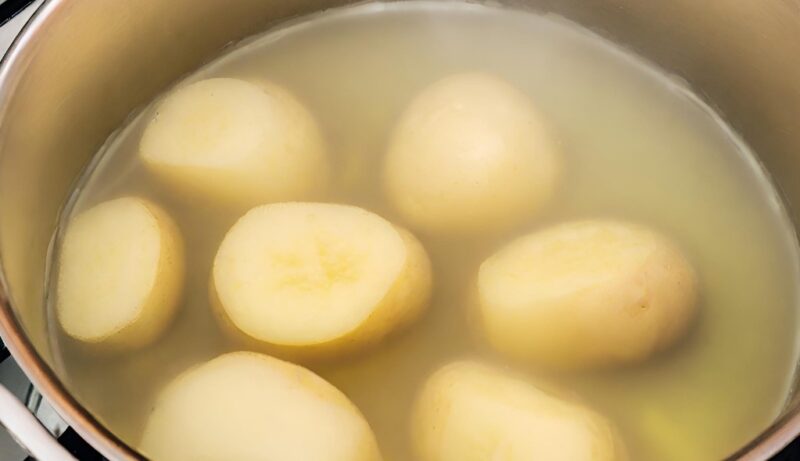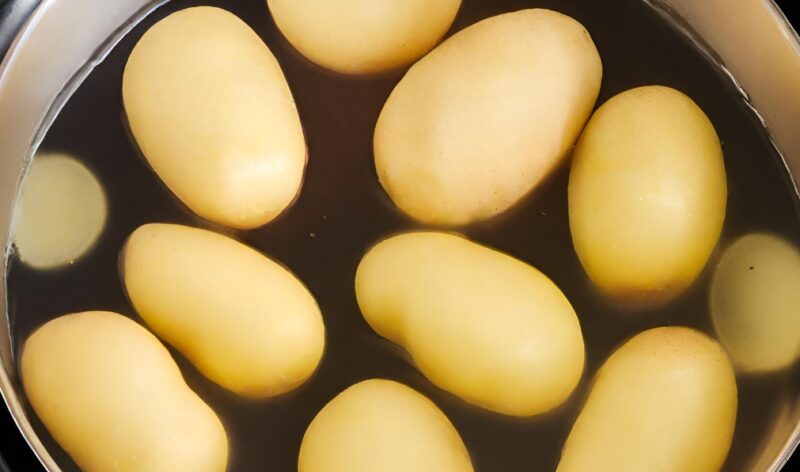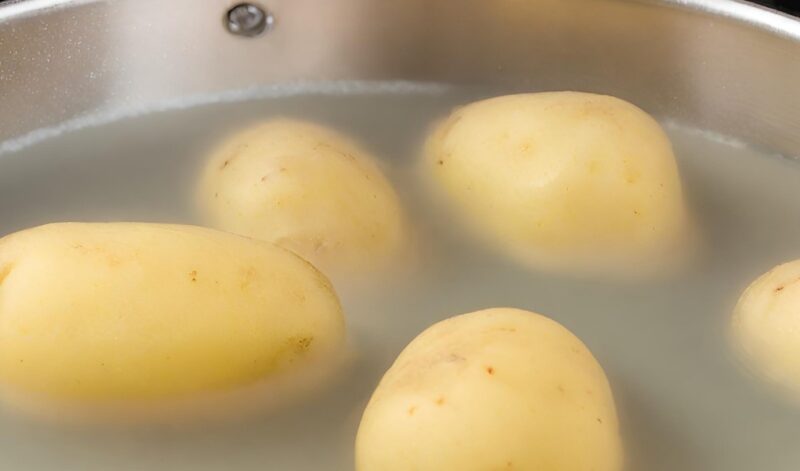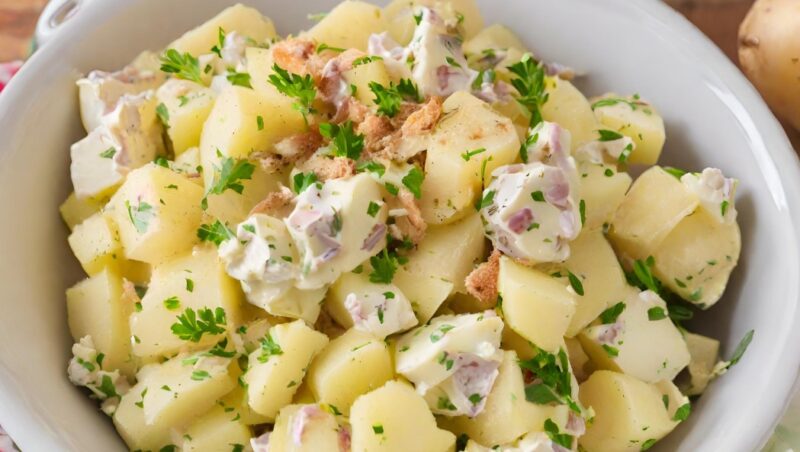Potato salad is a beloved dish known for its creamy texture, rich flavors, and versatility. Whether you’re making it for a family gathering or a simple weeknight dinner, one of the key elements to achieving the perfect potato salad is properly cooked potatoes.
The question that often arises is: How long should you boil potatoes for potato salad? In this article, we’ll explore the ideal boiling time.
What is the Best Time?
Boiling potatoes for potato salad is an art that demands precision. The difference between a perfectly creamy potato salad and a disappointing one often hinges on the timing of the boil.
Overcooked potatoes can disintegrate into an unappetizing mush, while undercooked ones remain hard and challenging to enjoy.
The Delicate Balance
Picture this: you’ve carefully selected the potatoes, washed them, and chopped them into uniform pieces. Now, it’s time to cook them to that sweet spot where they are neither too firm nor too soft.
The general rule of thumb for boiling potatoes for potato salad is to aim for a cooking time of about 10 to 15 minutes. However, keep in mind that this timing can vary slightly based on the size of your potato chunks.
Size Matters
The size of your potato chunks plays a crucial role in determining the ideal boiling time. Smaller pieces, naturally, will cook faster than larger ones. When cutting your potatoes, try to maintain uniformity in size to ensure even cooking. This will help you achieve a consistent texture throughout your potato salad.
Avoid Overcooking
One common mistake when boiling potatoes is overcooking them. Remember that potatoes will continue to soften slightly as they cool, so it’s crucial not to keep them on the stove for too long. Overcooked potatoes can become mushy and lose their distinct texture, which is essential for a good potato salad.
How to Determine When it is Cooked Properly?

Cooking potatoes for potato salad is a culinary task that requires precision. Achieving the right level of doneness is crucial to ensure that your potato salad turns out just right.
Undercooked potatoes can be hard and unpalatable, while overcooked ones can disintegrate into a mushy mess. So, how can you determine when your potatoes are cooked properly for your salad?
The Fork Test
One of the most reliable ways to check if your potatoes are cooked to perfection is by performing the fork test. It’s a simple yet effective method that requires no special equipment. Here’s how it works:
- Take a fork or a knife.
- Carefully insert it into one of the potato chunks.
- If the fork or knife easily penetrates the potato without encountering resistance, your potatoes are done.
The Desired Texture
When using the fork test, you’re looking for a specific texture. The potatoes should be tender, meaning that the fork or knife glides through them effortlessly.
However, they should not be so soft that they fall apart when pierced. Achieving this delicate balance is the key to perfectly cooked potatoes for your potato salad.
Avoid Overcooking
It’s essential to be vigilant when boiling potatoes, as overcooking can lead to undesirable results. Keep in mind that potatoes will continue to soften slightly as they cool.
Therefore, it’s crucial not to leave them on the stove for too long. Overcooked potatoes can lose their texture and become mushy, which is not what you want in a potato salad.
The Dangers of Eating Raw Potatoes

The common misconception is that all vegetables are much better as fresh. Raw potatoes come with their set of risks that every potato enthusiast should be aware of.
Glycoalkaloids
Raw potatoes contain natural compounds known as glycoalkaloids, and these substances can spell trouble when ingested in significant quantities.
Glycoalkaloids, specifically solanine and chaconine, serve as the potato’s defense mechanism against pests and pathogens in their natural environment. While they protect the potato plant, they can pose risks to humans when consumed in excess.
Digestive Discomfort
One of the immediate dangers of eating raw potatoes is the potential for digestive discomfort. These uncooked tubers contain resistant starches, which can be challenging for the human body to digest.
Consuming raw potatoes may result in stomach upset, gas, and bloating, as these resistant starches bypass the stomach and are fermented by microorganisms living in the intestines.
Toxic Compounds

Solanine, a toxic alkaloid found in raw potatoes, is a key player in the risks associated with their consumption. Ingesting solanine in large quantities can lead to symptoms such as headaches, nausea, diarrhea, and vomiting.
In extreme cases, it can even result in solanine and chaconine poisoning, though this requires a substantial intake of raw potatoes.
Light-Induced Toxicity
Here’s an interesting twist: if raw potatoes are exposed to light, they can become even more toxic. Exposure to light triggers the production of solanine, making the potatoes up to ten times more toxic.
This heightened toxicity can lead to severe health issues, including hallucinations, paralysis, loss of sensation, or even death.
Pathogen Risks
In addition to the inherent toxic compounds, raw potatoes also carry the risk of harboring harmful bacteria or viruses. This risk is especially heightened if the potatoes have not been adequately washed and peeled before consumption. Consuming raw, unwashed potatoes can lead to foodborne illnesses and other health concerns.
The Safer Alternative
Given these potential dangers, it’s clear that the safest route when it comes to enjoying potatoes in your salad is to use properly cooked ones. Cooking potatoes not only neutralizes these toxic compounds but also enhances their flavor and makes them easier to digest.
So, while raw potatoes may hold a certain rustic charm, it’s advisable to prioritize your health and opt for the deliciousness and safety of properly cooked potatoes in your potato salad recipes.
Best Recipes for Potato Salad

| Recipe | Ingredients | Instructions |
|---|---|---|
| Classic Potato Salad |
|
|
| Bacon Ranch Potato Salad |
|
|
| Mediterranean Potato Salad |
|
|
| Alternative Option: Grilled Potato Salad | Ingredients | Instructions |
|---|---|---|
| Grilled Potato Salad |
|
|
FAQs
Do you put potatoes in cold water after boiling?
No, you do not need to put potatoes in cold water after boiling. You should drain them well and let them sit in the strainer for a bit to let the steam evaporate excess moisture.
Should potatoes be cool before adding mayonnaise?
Yes, potatoes should be cool before adding mayonnaise. This will prevent the mayonnaise from melting and becoming runny.
Is it OK to cook potatoes day before making potato salad?
Yes, it is OK to cook potatoes a day before making potato salad. You can store them in an airtight container in the refrigerator and toss them with the dressing and other ingredients when you are ready to serve. Fridge is the best way to keep almost all types of food fresh for a longer time, especially when it comes to vegetables like potatoes, carrots, onion, and more.
Should potatoes be cool when making potato salad?
It depends on your preference and the type of dressing you are using. Some people like warm potato salad, especially with vinegar-based dressings, while others prefer cold potato salad, especially with creamy dressings.
Last Words
The ideal cooking time for potatoes destined for your salad bowl typically falls within the range of 10 to 15 minutes, depending on the size of your potato chunks. Achieving that coveted balance between tenderness and firmness is paramount, and the trusty fork test is your ally in this culinary journey.
As we’ve discovered, overcooked potatoes can turn mushy, while undercooked ones may be unappetizingly hard. Therefore, precision is key. When the fork or knife effortlessly glides through a potato chunk without resistance, you know you’ve hit the sweet spot.






